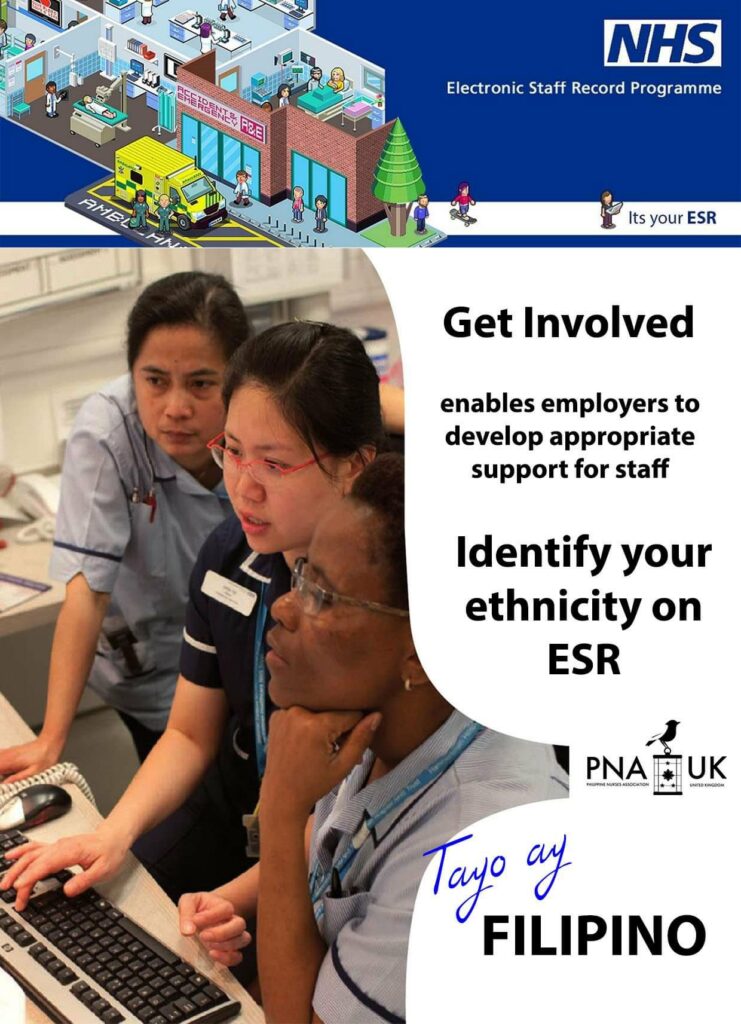
By Liezel Longboan
In 2020, at least 50 Filipino healthcare workers died with Covid-19, most of them working in care homes and in hospital Covid wards. Media reports described Filipinos as the ethnic group with the highest number of deaths among all health workers.
Despite this, Filipinos working in the sector were not specifically mentioned as a vulnerable group in Public Health England’s report that examined the disparities in the impact of Covid-19. Filipino nurses linked this in part to the absence of a “Filipino” ethnic category in official forms. Filipinos generally use “Any other Asian background” when completing monitoring forms.
However, after months of discussions and advocacy efforts, Filipinos working for the National Health Service now have their own ethnic category and can identify themselves as “Filipino” in their electronic staff record (ESR).
A chance to be identified, not to be othered
On Twitter, Professor Anton Emmanuel, head of the NHS Workforce Race Equality Standards (WRES), announced that “Filipino staff in #NHS can identify their ethnicity specifically on the electronic record (ESR)” on 18 January.
In a telephone interview, Emmanuel said the purpose of expanding the ethnic categories within the NHS employment records system was “to give staff themselves the chance to be identified, for them not to be othered. For us, NHS employer, to understand the challenges and benefits that particular ethnicities face so we can address them.”
When asked if this effort was in response to the high number of deaths among Filipino healthcare staff at the peak of the pandemic, Emmanuel acknowledged that “the NHS as a whole was not aware of the challenges being faced by Filipino staff (at that time).”
It is estimated that there are at least 40,000 Filipinos working in the NHS.
Read more: Opinion: It’s time to be counted as Filipinos
The announcement was immediately celebrated on Twitter by Filipino nurses who have been demanding for their own ethnic category arising from the disproportionate impact of Covid 19 among their ranks.
SO HAPPY that FILIPINO/FILIPINA is now officially recorded at the latest NMC registry report! Am still wondering how we can get those 6k & above ‘Any Other Asian’ to be corrected as I know previous Filipino registrants tick those before….maybe @nmcnews can help? pic.twitter.com/zC5t34srjY
— Louie Horne (@Louie_Horne) January 17, 2022
To be counted,to be visible is to belong.This is a milestone for the Filipino workforce in the history of NHS🙏@AntonEmmanuel2 @duncan_CNSE @HilaryGarratt @MRadford_HEECN @tinig_uk @kanlunganuk @philippinesinuk @DrHNaqvi @yvonnecoghill1 @Prerana_Issar @AmandaPritchard #FilSrNAUK https://t.co/bcCjd6gFcK
— Jen Cag (@jen_cag) January 18, 2022
However, NHS ESR later replied on Twitter that the “Filipino” category has in fact been available on the ESR since 2001. Some Filipino senior nurses challenged this and said they had been working in the NHS in various roles for two decades now but had not been made aware of this.
The ESR explained that the more detailed ethnic “sub-categories” had been available to individual NHS trusts but that it had been their “option” to use them.
Professor Anton Emmanuel explained that the categories were now available across the NHS. “We have made the system more accessible for everyone,” he said.
Nurses advocate for ‘Filipino’ category in the NHS
In March 2021, Filipino senior nurses, together with representatives from Kanlungan and Tinig UK, met with Professor Anton Emmanuel to voice their concern that their experiences were being lost in the broad category “Black and minority ethnic” (BAME).
During that meeting, they agreed that having a distinct “Filipino” category in the NHS where Filipinos make up the third largest ethnic group was one way to make visible their specific circumstances.
Historic moment indeed👍👍👍👍This is great news for nearly 40k Filipino nurses working in the U.K and hundreds of thousands of Filipinos in the U.K.👏👏👏Finally, we are being seen, heard and counted🙏 Our lived experiences will now be herd and actions taken to improve them🙏🙏 https://t.co/3UcvIqbPvX
— Francis Fernando, RN, BSN MSc Adv HCP (Open) NMP (@fernandof1974) January 19, 2022
Recalling that meeting, Emmanuel said that “It was an eye opener for me. It is important to think about the dignity of staff and to find ways of addressing the disadvantages faced by Filipino nurses.”
However, Emmanuel admitted that “I have a problem with the way Filipinos are often being described as kind and caring because it becomes an excuse for not promoting them.” He cautioned about stereotyping Filipinos who should be seen for their talent and skill.
Filipino nurse Louie Horne, clinical research fellow in the WRES team, has been working with Emmanuel and colleagues to think of ways of improving the conditions for ethnic minority staff in the NHS. As a Filipino, she welcomed this development saying, “We have been here in the last 25 years but there was no ethnic category for us. We deserve this.”
Horne explained that ‘The stars aligned’ for this moment, citing the following: the disproportionate impact of Covid-19 to Filipino healthcare workers, that Filipinos comprise the third biggest ethnic group working in the NHS and yet only very few of them are in leadership roles.
NMC also added ‘Filipino’ category
Apart from the NHS, it came to light that the Nursing and Midwifery Council (NMC) has also included ‘Filipino/Filipina’ category in its register. Horne tweeted on 17 January that the NMC’s latest report includes data on “Filipino/Filipina” and urged fellow Filipinos to amend their ethnic category.
Nurses started sharing the hashtag #IamFilipino with images of NHS and NMC ethnicity forms saying they have changed their ethnic category from “Any other Asian background” to “Filipino.”
With their own category, Filipinos can now start amending their information on the NHS and the NMC to correct existing data about them.












